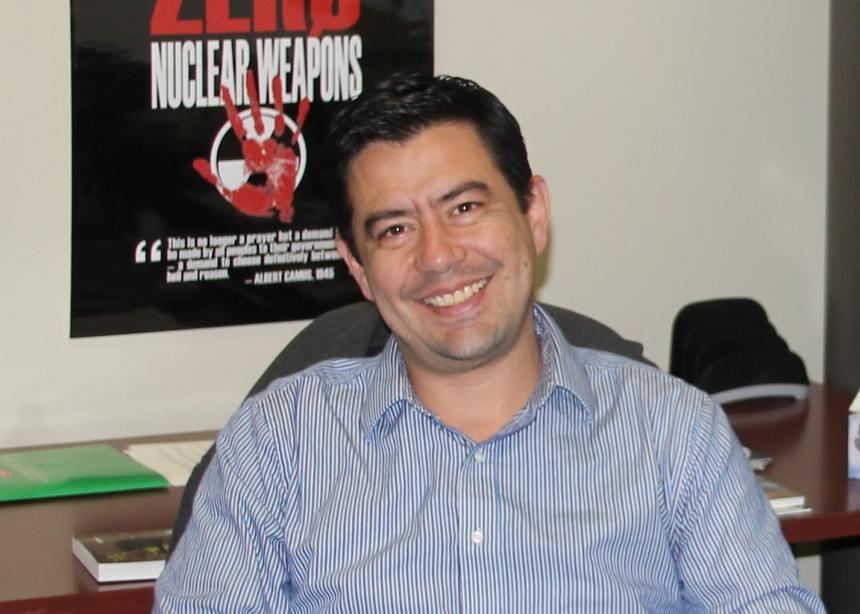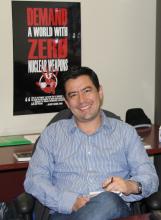Cesar Jaramillo, executive director at Project Ploughshares since last July, knows first-hand the need for new ways of dealing with conflict and violence.
He and his wife Paula Cardenas arrived in Toronto in January 2005 as political refugees from Colombia. Cardenas’s father was kidnapped by the Revolutionary Armed Forces of Colombia (FARC) guerrillas and held for ransom, and Jaramillo was the one who was sent to a remote mountain location with the money to secure his father-in-law’s release.
Because of this payment, the family was targeted by the right-wing paramilitaries as guerrilla sympathizers and supporters. Seeing no future for themselves in Colombia, Jaramillo and Cardenas fled.
“Speaking English was an asset,” says Jaramillo, who studied in an international school in Colombia and earned a Bachelor of Arts degree in journalism. Cardenas was a medical doctor. Put up by World Vision, they were eventually accepted as refugees.
Fate brought them to Waterloo, Ont., where they took turns returning to school to find employment in their fields or in new fields, as Jaramillo studied political science. Eventually, working at the Centre for International Governance Innovation, he came across Project Ploughshares, which then shared a building with CIGI. In 2009, when a program associate position became available, he applied. Six years later, when John Siebert left Project Ploughshares, Jaramillo applied and was hired as its new executive director.
Cardenas and Jaramillo did not travel back to Colombia for eight years. “It doesn’t look so good,” he says. “You’ve just left a place because your life is in danger and then you go back for Christmas?”
But they have returned in recent years. Medellín has become a backpacking and tourist location and is relatively safe. The drug trade has moved north into Mexico, says Jaramillo, and FARC and government are in ongoing peace negotiations, having to deal with the very issues which sparked the rebellion in 1964. He believes that no amount of violence, police, military or paramilitary force was able to end the rebellion or solve the issues. Only sitting down and talking is having that effect.
This is the kind of work that Project Ploughshares has always advocated and which it works to support. While it is an arm of the Canadian Council of Churches and has “a theological foundation” to all the organization does, Project Ploughshares speaks to governments, other non-governmental organizations and scholars, using policy language.
Jaramillo believes that Project Ploughshares’ work is to “help reduce human suffering” by being “a vigilant social society voice about security.” Working on nuclear disarmament, the small arms trade and space armaments, Ploughshares supplies the information needed for the negotiations and stirs up support for such negotiations by offering expert opinion.
During the week of Jan. 9-16, 2016, Jaramillo was interviewed by CBC’s Saturday morning news program, “Day 6,” about the Canadian government’s approval of the sale of light-armoured vehicles to Saudi Arabia, a perennial abuser of human rights. He also wrote two op-ed pieces for the Waterloo Region Record, one on the vehicle sale and the other on the double standard around nuclear weapons right after North Korea claimed to have detonated a hydrogen bomb. Many nations reserve the right to have such weapons, while at the same time decrying the proliferation of such weapons, he noted.
Jaramillo is not the only new hire at Project Ploughshares, as three new program associates have been hired in recent months: Branka Marijan, Sonai Marwah and Jessica West. While Project Ploughshares is forty years old, it has a new young and dedicated staff continuing the vision that Ernie and Nancy Regehr began, and which John Siebert guided through the past years of change.



Add new comment
Canadian Mennonite invites comments and encourages constructive discussion about our content. Actual full names (first and last) are required. Comments are moderated and may be edited. They will not appear online until approved and will be posted during business hours. Some comments may be reproduced in print.